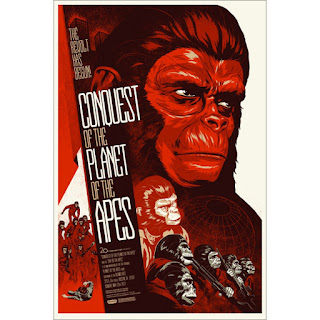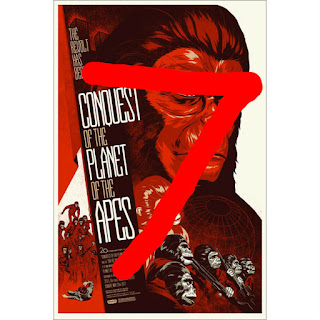Review- Conquest of the Planet of the Apes
Hey look, it's the pretty decent middle film that everyone forgets about. It could be comparative or maybe it is actually good but it certainly feels better than the last ones.
As was revealed at the end of the last movie, Milo (son of Zira and Cornelius) is very much alive but we've now jumped forward an unspecified amount of years into the future when all apes are now enslaved by humans and forced into doing menial tasks. Milo, under supervision by Ricardo Montalban, is kept away from this but slowly, his anger builds. The two become separated and Milo becomes a slave, auctioned off in a way very similar to that one scene from Get Out. Under slavery, he's trained in a weird scene that legit could have been directed by Kubrick and given the new name of Caesar. After Ricardo Montalban gets thrown out a window to his death, Caesar leads an ape revolution against the humans and it's surprisingly exciting. After Escape, the franchise manages to get back on its feet having now settled into its setting of near future as opposed to the far flung future of the other films. Of all the films, it may be the most grounded of them, although there is still plenty of time for ridiculous moments.
Performance wise, there is little to talk about once again (don't worry, there's less tomorrow). Roddy McDowall now plays a different ape, ironically the child of his previous character, starting the film as Milo and ending it as Caesar. It's an important distinction because the shift is in more than just name. At the start, he is just like any other ape but by the end, he becomes a great leader, capable of leading a whole nation against the life they once lived. He does pretty decent work, especially in the fantastic final act. Natalie Trundy is also in this film again but I have no idea which ape she played (yes, finally moved behind the mask because that is apparently preferable) so I can't really comment. Once again, the standout is Ricardo Montalban. He is given a little more to do in this film than in Escape but still not enough and is killed off far too soon. Still, he is an actor who oozes charisma and his character acts as the perfect catalyst for the violent rebellion.
A lot of people say that the original Planet of the Apes was largely about race relations and while I think it was maybe a little distracted by also talking about treatment of animals to truly focus on that, this film makes up for it with heavy handed yet enjoyable criticism on slavery here. The apes are all treated as lesser beings to humans and are literal slaves, being forced to perform humiliating tasks. One of the moments where we see this happen most clearly is where they're being conditioned in some sort of lab. The set is bizarre and the whole vibe feels weird. I don't know if it's just because they were made so close together but there is a Clockwork Orange vibe out from nowhere. Plus, there's probably parallels to the Russian revolution or something but I'm too dumb to know about that and people who study history are too smart to watch these films. Anyway, getting to the highlight of the film, the actual riot scene (which takes up the last third of the film) is legitimately well done. There's these long takes that create great tension, oddly impressive cinematography and some moments that really have resonance. It's a sequence that works much better than it has any right to be and it's what makes this film better than the others of the franchise.
Many give the sequels from the original franchise stick for not being as good as the original and while none of them are, this film is the closest. It has the heavy handed nature of the other sequels but also manages to be pretty enjoyable throughout, from the schlocky elements at the start to the legitimately great riot at the end. Flawed, yet enjoyable, which is why I give the film a
As was revealed at the end of the last movie, Milo (son of Zira and Cornelius) is very much alive but we've now jumped forward an unspecified amount of years into the future when all apes are now enslaved by humans and forced into doing menial tasks. Milo, under supervision by Ricardo Montalban, is kept away from this but slowly, his anger builds. The two become separated and Milo becomes a slave, auctioned off in a way very similar to that one scene from Get Out. Under slavery, he's trained in a weird scene that legit could have been directed by Kubrick and given the new name of Caesar. After Ricardo Montalban gets thrown out a window to his death, Caesar leads an ape revolution against the humans and it's surprisingly exciting. After Escape, the franchise manages to get back on its feet having now settled into its setting of near future as opposed to the far flung future of the other films. Of all the films, it may be the most grounded of them, although there is still plenty of time for ridiculous moments.
Performance wise, there is little to talk about once again (don't worry, there's less tomorrow). Roddy McDowall now plays a different ape, ironically the child of his previous character, starting the film as Milo and ending it as Caesar. It's an important distinction because the shift is in more than just name. At the start, he is just like any other ape but by the end, he becomes a great leader, capable of leading a whole nation against the life they once lived. He does pretty decent work, especially in the fantastic final act. Natalie Trundy is also in this film again but I have no idea which ape she played (yes, finally moved behind the mask because that is apparently preferable) so I can't really comment. Once again, the standout is Ricardo Montalban. He is given a little more to do in this film than in Escape but still not enough and is killed off far too soon. Still, he is an actor who oozes charisma and his character acts as the perfect catalyst for the violent rebellion.
A lot of people say that the original Planet of the Apes was largely about race relations and while I think it was maybe a little distracted by also talking about treatment of animals to truly focus on that, this film makes up for it with heavy handed yet enjoyable criticism on slavery here. The apes are all treated as lesser beings to humans and are literal slaves, being forced to perform humiliating tasks. One of the moments where we see this happen most clearly is where they're being conditioned in some sort of lab. The set is bizarre and the whole vibe feels weird. I don't know if it's just because they were made so close together but there is a Clockwork Orange vibe out from nowhere. Plus, there's probably parallels to the Russian revolution or something but I'm too dumb to know about that and people who study history are too smart to watch these films. Anyway, getting to the highlight of the film, the actual riot scene (which takes up the last third of the film) is legitimately well done. There's these long takes that create great tension, oddly impressive cinematography and some moments that really have resonance. It's a sequence that works much better than it has any right to be and it's what makes this film better than the others of the franchise.
Many give the sequels from the original franchise stick for not being as good as the original and while none of them are, this film is the closest. It has the heavy handed nature of the other sequels but also manages to be pretty enjoyable throughout, from the schlocky elements at the start to the legitimately great riot at the end. Flawed, yet enjoyable, which is why I give the film a




Comments
Post a Comment